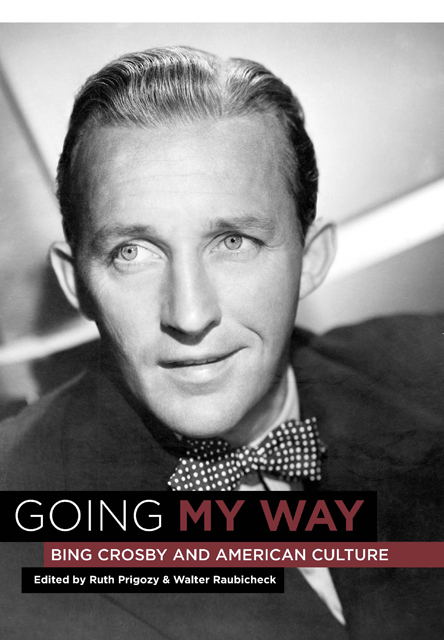Book contents
- Frontmatter
- Dedication
- Contents
- List of Illustrations
- Foreword
- Preface
- Acknowledgments
- Introduction Bing Crosby—Nothing Is What It Seems
- Part 1 Theoretical Perspectives on Crosby
- Part 2 Cultural Perspectives on Crosby
- Part 3 Historical Perspectives on Crosby
- Personal Comments
- Selected Bibliography
- List of Contributors
- Index
7 - Crosby at Paramount: From Crooner to Actor
Published online by Cambridge University Press: 11 March 2023
- Frontmatter
- Dedication
- Contents
- List of Illustrations
- Foreword
- Preface
- Acknowledgments
- Introduction Bing Crosby—Nothing Is What It Seems
- Part 1 Theoretical Perspectives on Crosby
- Part 2 Cultural Perspectives on Crosby
- Part 3 Historical Perspectives on Crosby
- Personal Comments
- Selected Bibliography
- List of Contributors
- Index
Summary
During Hollywood's Golden Age, the studios created, shaped, and promoted the personae of their contract players to such an extent that a Warner Bros. star like Bette Davis could never have achieved the same degree of stardom at another studio. Think of Gene Kelly and Judy Garland without MGM, and without directors on the order of George Sidney, Charles Walters, and Vincente Minnelli. Think of Rita Hayworth without Columbia, where she reigned without competition. And finally, think of Crosby without Paramount; or, rather, think of Crosby in the 1930s at any other studio. Warner Bros. had its resident crooner in Dick Powell. Universal and Columbia were courting sopranos—Deanna Durbin and Grace Moore, respectively. Fox was grooming Alice Faye, and MGM had a powerhouse team in Jeanette MacDonald and Nelson Eddy. Although Crosby put in two appearances at Universal (East Side of Heaven [1939] and If I Had My Way [1940]), that studio could never have become his home. Universal eventually found its own musical voice, which was not that different from Paramount's. The format was the same: comedy (romantic/farcical/slapstick) with musical interludes. Although Universal could claim to have its share of stars (e.g., Allan Jones, Donald O’Connor, Gloria Jean, Susanna Foster, Peggy Ryan), none of them ever became movie icons or international celebrities. Crosby, on the other hand, became both—and Paramount helped. If Crosby had never spent a quarter of a century at Paramount, he would still have been the recording artist, but never the Oscar-winning movie star.
With the coming of sound, Paramount embarked upon a new kind of movie that was neither a musical nor a straight film, but one with musical numbers that were rarely integrated with the plot and were, for the most part, diversions. In other words, these films were not musical comedies, but comedic musicals.
- Type
- Chapter
- Information
- Going My WayBing Crosby and American Culture, pp. 87 - 98Publisher: Boydell & BrewerPrint publication year: 2007



